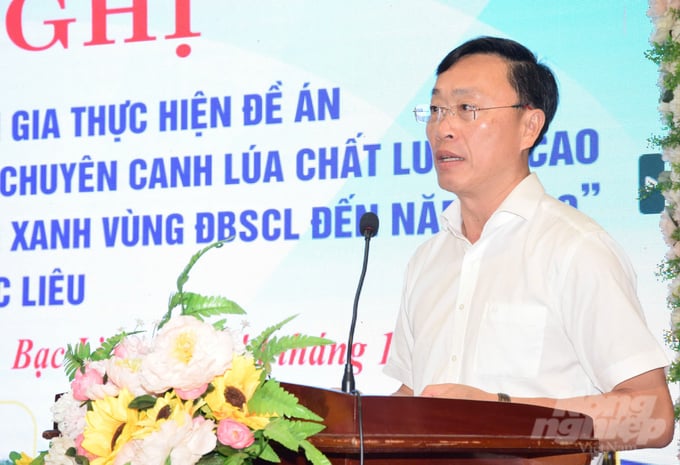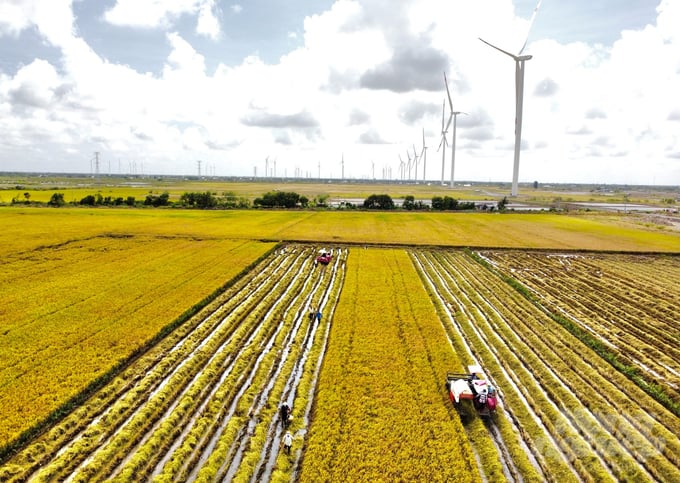November 26, 2025 | 23:24 GMT +7
November 26, 2025 | 23:24 GMT +7
Hotline: 0913.378.918
November 26, 2025 | 23:24 GMT +7
Hotline: 0913.378.918
On November 14, the People's Committee of Bac Lieu Province held a conference to launch the plan for implementing the 1 Million Hectares Specialized High-Quality, Low-Emission Rice Project, linked to green growth in the Mekong Delta region by 2030.
According to the plan, Bac Lieu aims to develop 28.000 hectares of specialized high-quality, low-emission rice by 2025, with plans to expand the area to around 46.000 hectares by 2030. The project will be implemented in five key districts and towns: Hoa Binh, Vinh Loi, Phuoc Long, Hong Dan, and the town of Gia Rai.

Mr. Huynh Huu Tri, Vice Chairman of the People's Committee of Bac Lieu Province, gave a directive speech at the conference. Photo: Trong Linh.
According to the plan, the agricultural sector of Bac Lieu Province will focus on carefully reviewing and selecting specific areas to participate in the implementation of the project. This will be followed by the development of detailed annual registration and execution plans, with particular emphasis on ensuring the completion of criteria related to land use planning and the development of necessary infrastructure in the selected areas.
In the second phase, which spans from 2026 to 2030, Bac Lieu will focus its efforts on expanding the area dedicated to the project, along with making necessary investments to complete and upgrade infrastructure in newly identified areas. The province will also work on reorganizing production processes, creating and strengthening value chains, and refining the implementation of systems for measuring, reporting, and verifying emission reductions. Furthermore, Bac Lieu will work to ensure the continuation of sustainable production practices in the regions that have successfully met the goals outlined for the first phase of the project (2024–2025).
At the conference, representatives from the agricultural sector, local governments, businesses, cooperatives, and farmers shared numerous opinions and recommendations regarding the direction of support to enhance the quality of activities within cooperatives and production groups participating in the project. Suggestions included providing support for the establishment of community-based agricultural extension groups to help implement the project. There were also discussions on the need to promote and implement high-quality, low-emission rice production processes as prescribed by the Crop Production Department. The participants also emphasized the importance of offering preferential loan policies for organizations and individuals involved in the project, as well as providing clear guidance on linking production with rice purchasing and consumption in alignment with the project’s objectives.

In 2025, Bac Lieu province will produce 28.000 hectares of high-quality, low-emission rice. Photo: Trong Linh.
Mr. Dang Minh Phap, Head of the Department of Cooperative Economics and Rural Development in Bac Lieu Province, stated that in recent times, the agricultural sector has actively implemented policies to support production linkages, particularly in rice cultivation. In addition, the sector has supported infrastructure and production equipment for cooperatives, as well as assistance with registering intellectual property rights for product trademarks for cooperatives.
The Department of Agriculture and Rural Development of Bac Lieu Province has effectively utilized and integrated various sectoral programs and projects to provide significant support for cooperatives in enhancing their economic performance. Additionally, the department has tasked its various subordinate units with the responsibility of providing direct, hands-on assistance to the cooperatives.
Mr. Huynh Huu Tri, Vice Chairman of the People's Committee of Bac Lieu Province, urged all relevant departments, agencies, organizations, and local authorities to carefully follow the outlined plans and responsibilities that have been assigned to them. Moreover, he encouraged regular communication with the Department of Agriculture and Rural Development, as well as periodic reporting to the provincial government, to ensure that any emerging challenges or obstacles could be swiftly addressed and resolved.
Vice Chairman Huynh Huu Tri also expressed his strong expectation that businesses would play a more active role in investing in and fostering partnerships with farmers, particularly cooperatives. These collaborations would provide farmers with more favorable conditions, enabling them to access high-quality agricultural inputs at affordable prices. Additionally, Mr. Tri highlighted the importance of adopting modern agricultural technologies and techniques that could help reduce production costs and improve overall operational efficiency.
Translated by Phuong Linh

(VAN) The Mekong River Commission adopts the 2026 - 2030 Strategic Plan with a people-centered approach.
/2025/11/26/1720-1-200855_132.jpg)
(VAN) Viet Nam and Japan have many conditions to expand cooperation on climate change adaptation, particularly in disaster risk management based on advanced technologies.

(VAN) The strong development of digital technology and artificial intelligence is opening up opportunities to transform science and technology into a 'Magic eye' for disaster forecasting and early warning.

Applying vaccines and proactive disease prevention helps pig herds stay healthy, maintain productivity, reduce risks, and decrease reliance on antibiotics in modern livestock farming.

(VAN) Many advanced agricultural technologies and products were shared at the Viet Nam - South Korea Agricultural Technology Introduction, Trade Promotion, and Connection Seminar 2025.

(VAN) Minister Tran Duc Thang hopes to strengthen connections and exchanges with China in agriculture and environment sector through the Embassy of Vietnam in Beijing.

(VAN) After 50 years of strategic cooperation, Viet Nam and UNICEF remain committed to promoting fair and inclusive development for all children in the digital future.